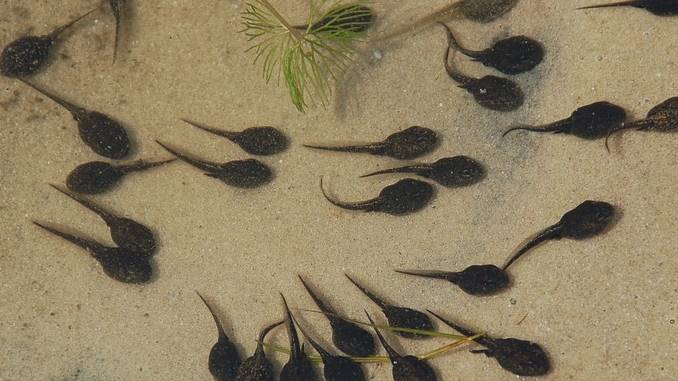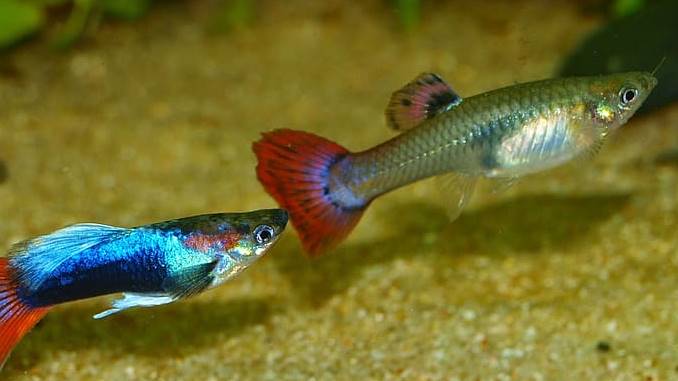Disclaimer: The information presented below is for general informational & educational purposes only. Always consult with animal professionals in case of specific concerns.
Mosquitoes are tiny flying insects present almost anywhere on Earth.
They are members of the Diptera order and Culicidae family, considered true flies.
These creatures can move and escape from enemies swiftly once detected, thanks to their tiny appearance. However, this advantage still fails to save them from particular predators.
We all want to know “what eats mosquitoes?” in nature to use it as a trick to reduce those pesky flies in the house.
Let’s walk through the hunting animals that feast on them!
What Eats Mosquitoes?

Dragonflies, bats, tadpoles & frogs, spiders, birds, hummingbirds, and fish are typical animals that hunt mosquitoes. They also play an important role in keeping this insect’s population at bay.
Dragonfly
One of our favorite flying insects, also a natural mosquito hunter, is the unique, fascinating dragonfly. People often call dragonflies ‘mosquito hawks’ due to their ability to hunt hundreds of flies.
Despite consuming a lot of flies, dragonflies don’t make a considerable contribution to those insects’ population in nature.
However, we find them an effective predator because one of the primary elements in their diets during the aquatic stage is the mosquito larvae.
This stage typically lasts for six years maximum and is when the dragonfly causes the most devastating damage to those flying species.
After going through this period, a mature dragonfly prefers going out to hunt during the daytime, when the flies often hide in timberlines and bushes.
Dragonflies are naiads, appearing as little bold, voracious predators since they will attack and eat any aquatic creature, even other naiads.
Bat
Do bats eat mosquitoes? Yes, they do. However, bats don’t make good pets just because of that. Like other voracious predators, bats are evil, opportunistic feeders.
Whenever there’s a food source available, they will never skip the chance. Being notorious for killing flies doesn’t mean that they only go out and feast on flies.
Many studies have suggested that mosquitoes account for no more than 1% of a bat’s daily diet. Its favorite foods turn out to be moths, wasps, and beetles.
Though bats are not the voracious mosquito hunters that many suppose, they greatly reduce those little creatures in your garden or house.
While televisions usually describe them as scary flying animals that prefer moving in the dark, they can be an excellent assistant in eating many harmful, hazardous flying pests like mosquitoes.
Tadpole and Frog

Toads and frogs are some of the animals with webbed feet that catch mosquitoes. However, they don’t primarily rely on it as a must-have element in their diet.
Most tadpole species are infrequent mosquito feeders since they only hunt the insect during food shortages or if they encounter it by accident.
Yet, three species originating from North America commonly eat mosquito larvae, particularly during the tadpole stage. They are spadefoot toads, giant tree frogs, and green tree frogs.
Still, toads, tadpoles, and frogs attack mosquito larvae to fill their stomachs, making a tiny contribution to the reduced mosquito population.
Related: What Eats Frogs In The Food Chain?
Spider
Though spiders would rather choose other meals if different options are available, they sometimes have mosquito snacks.
The two Paracyrba Wanlessi and Evarcha Culicivora spider species are adept at capturing flying insects. These predators will even choose to miss other meals to chase a mosquito.
Evarcha Culicivora spiders, which originate from East Africa, prove their intelligence through the hunting strategy. They opt for female flies full of blood or have just finished a meal.
This vampire spider species is renowned for choosing its prey according to the prey’s food sources. Isn’t it a unique and fascinating characteristic?
More interestingly, a mature Evarcha Culicivora can become more charming in a dating scene by eating a mosquito full of blood.
Meanwhile, the Paracyrba Wanlessi species often stalks flies in Malaysian bamboo forests, described as a miniature-cat-like spider. It feasts on both larval-stage and adult flies, whether its prey is full or empty.
Bird
Tiny insects account for a large proportion of a bird’s diet, including mosquitoes. Birds are fond of both aquatic and adult creatures.
Birds look for and eat flies during flights or doing daily outdoor activities in the daytime, which allow them to become a fantastic mosquito population regulator.
Some most popular birds that eat flying insects are waterfowl (ducks, terns, geese), purple martins, warblers, swallows, and songbirds.
Swallows primarily consume tiny flying pests, such as mosquitoes, dragonflies, moths, and flies. Their stunning movement is one of the unique features helping them stand out from the crowd.
You may wonder how to attract birds that eat mosquitoes to your garden or yard, right?
For small-sized insectivores, like bluebirds or swallows, the best method to draw them to your garden is to build colony houses or nest boxes.
Birds often show up at the beginning of the year to create nests and raise several families there during the summer. They’ll migrate to other warmer places before winter.
Read more: What Eats Birds In The Food Chain?
Hummingbird
‘Do hummingbirds eat mosquitoes?’ is a commonly asked question, and the answer is yes. Hummingbirds are mosquito eaters and consume a lot of them.
The tiny size can sometimes put a fly at a disadvantage, and that’s the case when dealing with a hummingbird. The hummingbird can effortlessly capture and eat it in the air, standing water, or the spider nets.
The superior sensing power and eyesight of hummingbirds support them in identifying those tiny creatures and preying on them.
A hummingbird often chases its prey around for a few minutes to make it tired, then takes the chance to eat it.
Fish

Despite mostly functioning in water, fish is a feat of many flying insects and an effective tool that helps reduce them in your yard. Some most popular feeders are goldfish, bluegills, catfish, bass, and guppies.
The worst predator has to be the Gambusia affinis, usually called ‘mosquito fish.’
This species is an aggressive and fatal eater that contributes a lot to decreases in the fly population.
Plants That Eat Mosquitoes
Surprisingly, some plants can help with the pest problem in your garden.
Catnip
Catnip gains an outstanding reputation for its impact on cats; yet another helpful side of this plant is that it can act as a powerful insect repellant.
It is a close member of the mint herb, and like marigolds and citronella, it emits an odor that scares pests away, preventing them from coming close.
The downside is that catnip only serves excellently as a pest repellent only if the pests are in the near scope, implying that you can’t shield your entire garden from insects with only this plant.
Nevertheless, when applied to your skin, catnip oil is a wonderful protector, functioning as a safe bug spray. This plant is also straightforward to care for, meaning that you’ll always have a sustainable supply.
Citronella
While predominantly grown in Asia, citronella is broadly popular among Southern gardeners and homeowners as an effective insect solution.
This mass grass produces a strong odor that stresses insects and helps with other pest control. Such a helpful natural property makes it a frequently seen ingredient in insect repelling products.
People also use citronella for calming barking dogs or creating beautiful-scented perfumes.
The grass plant successfully creates spray solutions that prevent bugs from destroying household valuables and furniture.
Marigolds
Besides the vibrant and appealing coloration, marigolds feature a unique scent that turns them into an extraordinary natural bug deterrent.
They can help scare away harmful insects, including mosquitoes, that pose hazards to other plants in your yard.
If you are a gardener keen on growing vegetables and foods yourself, marigolds should have good positions in your yard.
You can grow them from a tiny seed or starter plant. After a period of proper care and maintenance, they will help cut down on the mosquito numbers and beautify your home significantly.
How Do Mosquitoes Defend Themselves?
Humans may consider mosquitoes meaningless or harmful creatures, but they play a critical role in balancing the ecosystem. They’re an indispensable biomass source in the natural food chain.
Thus, nature gives them a few resources to protect themselves from predators.
This species has a painkiller that enables it to bite and take blood from its victims without letting them detect it.
Besides, it can fly swiftly, so other predators and even humans find it challenging to catch and kill one.
FAQ’s
Do Ladybugs Eat Mosquitoes?
No, they don’t. Though ladybugs are carnivores, they don’t like eating bloodsucking pests, such as bed bugs and mosquitoes.
Sometimes, ladybugs also consume garden insects, but they will choose male creatures who only feast on nectar.
Do Mosquitoes Do Anything Well?
Yes, as said. These flies may seem irritating and pointless to humans, but the ecosystem needs them to maintain the best balance.
The animals form an essential biomass source in the natural food chain, acting as a food source for frogs, bats, and birds as mature flies and fish and tadpoles as larvae.
What Smells Do Mosquitoes Hate?
These flies are highly sensitive to scents, which is helpful when they’re searching for nearby food sources.
They hate strong odors that can go further than the less powerful ones, such as pine oil, rosemary, catnip, citronella oil, lemon eucalyptus oil, cinnamon bark oil, geranium oil, peppermint oil, and lavender.
Do Swallows Eat Mosquitoes?
Yes, barn swallows are nuts about insects that humans usually consider pesky, particularly those true flies, flying termites, and gnats. An average barn swallow can eat 60 bugs one hour or 850 a day!
Conclusion
Nature-based solutions may not generate the best result regarding insect control like chemical-based ones, but studying what eats mosquitoes will help you know which creatures and plants can do your backyard a favor.
Remember that bloodsucking pests may spread many disorders, so this topic is not something you can take lightly.

Hi, my name is John, and I’m an animal lover. I’ve been fascinated with the animal kingdom since I was 5 years old, and my passion keeps growing bigger as I age. And this blog is where I share my researches and passion with animal lovers all around the world.
